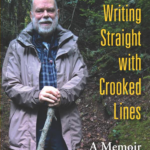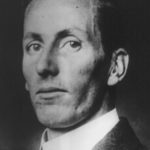Last fall, political pundits of various stripes informed us that the upcoming 2024 election would be the most important one of our lifetimes. Never mind that we have been told this every presidential election year in this century—this time it was really true. Many of us heeded the warning, absorbed ourselves in the promises of… continue reading
Writing Straight with Crooked Lines: Jim Forest’s Memoir
Jim Forest, Writing Straight with Crooked Lines: A Memoir. Maryknoll, NY: Orbis Books, 2020. 326 pp. + ix. For three decades, Jim Forest has written books on prayer, friendship, forgiveness, and a string of biographies on Dorothy Day, Thomas Merton, and Daniel Berrigan, all of which offer snippets from his personal experiences. But in this… continue reading
Ben Salmon, Catholic Conscientious Objector
Michael J. Baxter co-founded and lived and worked at Andre House in Phoenix (1984-88) and the Peter Claver Catholic Worker in South Bend (2003-09). He directed the Catholic Peace Fellowship from 2001-2012. He currently teaches Religious Studies and Catholic Studies at Regis University in Denver and is completing a collection of his essays on Catholic… continue reading
A Familiar Pilgrimage In Remarkable Detail: A Review Essay: The Duty of Delight: The Diaries of Dorothy Day, ed. Robert Ellsberg (Milwaukee: Marquette University Press, 2008), 669 pp. + xxxiv.
Michael Baxter teaches at the University of Notre Dame and lives and works at the Catholic Worker in South Bend, Indiana. He is also national secretary for the Catholic Peace Fellowship. Introduction The arrangement whereby the diaries of the Dorothy Day were transferred from the Catholic Worker in New York to the archives at Marquette… continue reading
Why Catholics Should Be Wary of “One Nation Under God”: Richard Neuhaus in a Time of War
1. “I ALWAYS THOUGHT JESUS WAS AN AMERICAN” “I know you’re all going to think this is crazy, but I always thought Jesus was an American.” This statement was uttered by a young woman in a seminar at the University of California at San Diego on the first century of Rome and the dawn of… continue reading
Just War and Pacifism: A “Pacifist” Perspective in Seven Points
Having been asked to speak from a pacifist perspective, I should state right away that I have misgivings about the word “pacifism.” Not only does it have connotations of an unreasonable refusal to take up arms to defend the innocent, like your wife or daughter or grandmother who is being raped. It also implies a… continue reading
After September 11, 2001: What Should We, as Catholics, Do? Patriotism and Pacifism
Fr. Baxter is a professor of theology at the University of Notre Dame and a Catholic Worker. In 1917, Senator Hiram Johnson said that “the first casualty when war comes is truth.” Given that the attacks last week on New York and Washington have been widely described as acts of war, and seem to have… continue reading
A Homily on the Feast of the Triumph of the Cross, Three Days after September 11, 2001
Numbers 21: 4-9 Psalm 78: 1-2, 34-35, 36-37, 38. Philippians 2:6-11 John 3:13-17 With their patience worn out, the people complained against God. Why have you brought us to this desert? Why do you give us this food, this drink? We are disgusted at this wretched food and drink. Why have you allowed this… continue reading
“Blowing the Dynamite of the Church”: Catholic Radicalism from a Catholic Radicalist Perspective
In the wake of their momentous encounter in December 1932, Peter Maurin subjected Dorothy Day to a pedagogical program that he dubbed “indoctrination,” which, from Day’s account, consisted of Maurin coming over to her apartment and expounding to her on God, the Church, the Church Fathers, the saints, the poor, hospitality, liberalism, capitalism, fascism, communism,… continue reading



